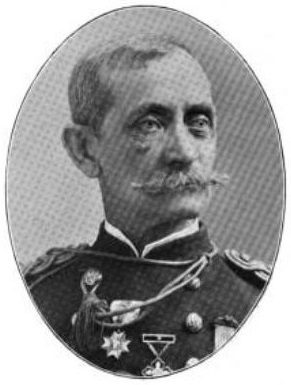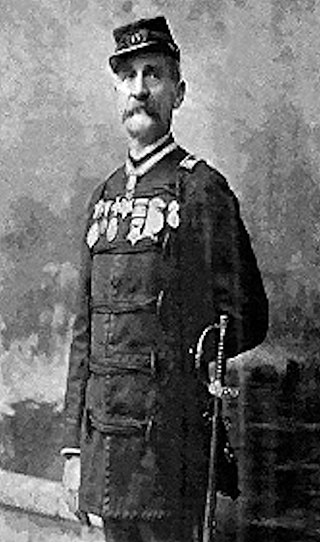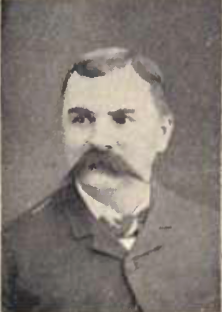
William Harvey Carney was an American soldier during the American Civil War. Born enslaved, he was awarded the Medal of Honor in 1900 for his gallantry in saving the regimental colors during the Battle of Fort Wagner in 1863. The action for which he received the Medal of Honor preceded that of any other African American Medal of Honor recipient; however, his medal was actually one of the last to be awarded for Civil War service. Some African Americans received the Medal of Honor as early as April 1865.

Guy Vernor Henry was an American military officer and Medal of Honor recipient who served as military governor of Puerto Rico.

USS Pontoosuc was a Union Navy vessel in the American Civil War. A side wheel gunboat, Pontoosuc was built under contract with G. W. Lawrence and the Portland Company, Portland, Maine, and was named for Pontoosuc, Illinois, on the Mississippi River. She was commissioned at Portland on 10 May 1864 with Lieutenant Commander George A. Stevens in command.

Bruce Anderson was an African American Union Army soldier in the American Civil War and a recipient of America's highest military decoration, the Medal of Honor, for his actions during the Second Battle of Fort Fisher.
James Robert Evans was an American Civil War soldier and Medal of Honor recipient.

Aaron Anderson or Sanderson was a Union Navy sailor during the American Civil War and the first African-American to be a recipient of America's highest military decoration, the Medal of Honor.

Charles E. Morse was an American Civil War soldier who received the Medal of Honor for his actions during The Battle of the Wilderness in that war.

Thomas Wilson Bradley was a United States Representative from New York and a recipient of the United States military's highest decoration, the Medal of Honor.
Frederick Charles Anderson was a Union Army soldier in the American Civil War who received the United States military's highest decoration, the Medal of Honor. Born in Boston, Massachusetts, and orphaned at a young age, Anderson was adopted by a farming family in rural Raynham. He enlisted in the Union Army shortly after the start of the war and, as a private in the 18th Regiment Massachusetts Volunteer Infantry, participated in several major battles, including Antietam, Fredericksburg, Chancellorsville, and Gettysburg. He was awarded the Medal of Honor for capturing a Confederate battle flag during the Battle of Globe Tavern on August 21, 1864. Transferred to the 32nd Regiment Massachusetts Volunteer Infantry and wounded in the Siege of Petersburg, he returned to the field in time to witness the Confederate surrender at Appomattox Court House. After the war, he returned to Massachusetts, working and raising a family until his sudden death at age 40.

James A. Williamson was a politician and lawyer who served in the Union army during the American Civil War, rising to the rank of brigadier general. He received the Medal of Honor for his actions at the Battle of Chickasaw Bayou.

James Martinus Schoonmaker Sr. was a German American colonel in the Union Army in the American Civil War and a vice-president of the Pittsburgh and Lake Erie Railroad. He received the Medal of Honor for gallantry at the Third Battle of Winchester on September 19, 1864.

Peter T. Anderson served in the Union Army during the American Civil War. He received the Medal of Honor for his actions during the Battle of Bentonville.
Robert N Anderson was a Union Navy sailor in the American Civil War and a recipient of the United States military's highest decoration, the Medal of Honor.
James Anderson, born James Anderson Smythe, was a Canadian-born soldier in the U.S. Army who served with the 6th U.S. Cavalry during the Texas–Indian Wars. He was one of six men received the Medal of Honor for gallantry against a hostile band of Plains Indians at the Wichita River in Texas on October 5, 1870.

For the federal official appointed see Charles William Anderson
Thomas A. Anderson was a United States soldier and native of Pennsylvania who fought with the Union Army as a corporal in Company I of the 1st West Virginia Cavalry during the American Civil War. He was awarded his nation's highest award for valor, the U.S. Medal of Honor, for capturing the flag of a Confederate regiment during the Battle of Appomattox Station on April 8, 1865. The award was conferred on May 3 of that same year.

Everett W. Anderson was an American soldier who received the Medal of Honor for valor during the American Civil War.













